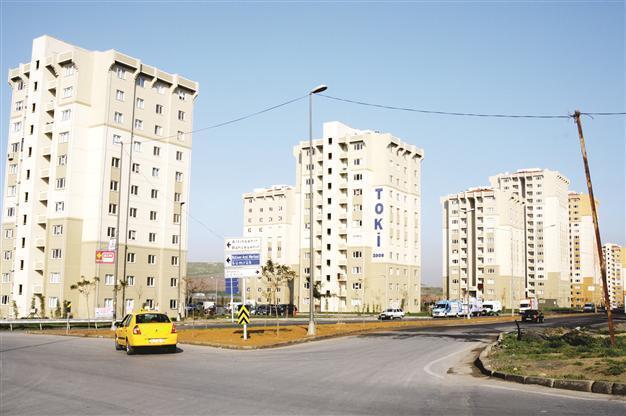Housing agency’s reign grows amid esthetic and transparency criticism
MUSTAFA SÖNMEZ

TOKİ has built more than 600,000 over the past 10 years and most of these settlements are the ones built for low- and middle-income citizens within the urban transformation program of the government, TOKİ says. AA photo
Saying the most salient sector of Turkey’s past 10 years has been construction wouldn’t be an exaggeration. Rapid and massive house, office, stadium, hotel and shopping mall construction etc. have followed each other in metropolises, notably in Istanbul. And it should be noted that this is a significant choice of capital accumulation process.Particularly Istanbul, which bids to be a “global city,” has turned into a giant construction site. Constructions have opened space for several industrial facilities and stimulated their output production while turning the wheels of the banking system in the meantime thanks to housing loans.
TOKİ’s leading role
The leading actor of these construction activities is Housing Development Administration, also referred to as TOKİ, which is directly under Turkish Prime Minister Recep Tayyip Eroğan’s authority. When it was founded in 1984, TOKİ’s presence was aimed at generating social housing facilities for low-income people. But by 2002, the number of houses constructed by TOKİ for low-income was only 43,000.
Under the Justice and Development Party’s (AKP) rule, Erdoğan has made TOKİ affiliated with the Prime Ministry, expanded the scope of its authorities and most importantly he transferred the tasks and liabilities of the Urban Land Office, the institution which manages public lands, to TOKİ. That allowed TOKİ to rule over public lands worth billions of liras. TOKİ doesn’t get a share from the central budget directly as it’s under the Prime Ministry’s authority. The plan was like this: TOKİ was going to give valuable public land to contractors and get a share of the prestigious houses they produced. It was meant to realize its duty of producing public housing construction through the sale of these houses.
Emlak REIT, Turkey’s biggest real estate investment trust which used to be a branch of shutdown state bank Emlak Credit Bank, was also transferred to TOKİ.
Authority over land
TOKİ says the number of houses it has built in the past 10 years has surpassed 600,000 and most of these settlements are the ones built for low- and middle-income citizens within the urban transformation program of the government. It also notes these houses have cost 40 billion Turkish Liras. It’s understood that these are financed by the income yielded through luxury house sales and land sales.
In this respect, TOKİ is also the institution that procures lands, which big large construction firms are in urgent need of.
TOKİ, which leaves its mark on the texture of big cities, with Istanbul on the top, has been increasingly condemned for the concretion of urban areas and destroying their sui-generis characteristics.
The location concentration of TOKİ projects also displays an unequal picture as almost 30 percent of the 40 billion-lira 1500 project construction is in Istanbul while 11 percent of is in the capital Ankara.
Moreover, the quality of the 25 largest TOKİ projects reveal that the housing agency is an institution that shares out the Istanbul rent between companies building luxury houses and shopping malls to high-income layers of the society.
Despite houses built within TOKİ’s “Fundraising and EMLAK REIT” program accounting for only 20 percent of overall houses, their share within project costs is more than 50 percent.
‘Not transparent’
Questions over TOKİ’s transparency are a bigger problem. For a long time, it was kept outside the scope of Law on Public Finance Management and Control. It has grown prodigiously and became one of the most significant tools of the AKP’s populist policies. Despite it coming under the audition of Court of Accounts, it is still the target of criticism, accusing it of being the “prince of darkness” of the construction sector.

TOKI EARNS VIA LAND FOR FLAT PROJECTS
TOKİ receives a share from the projects undertaken in cooperation with large Turkish construction firms like Ağaoğlu, Kuzu, Varyap or Aşçıoğlu, by using lands in its portfolio. In this model, TOKİ leaves the development of the land and the financing of the whole project to the contractor.
The largest of these projects are in Istanbul, in particular in the most rentable places of Istanbul. Ankara and Izmir are other two cities contain houses built with this model, which have surpassed 86,000 in total.
Up to this day, TOKİ has raked a lot in cash simply through selling land as well. The former home stadium of Galatasaray, Ali Sami Yen, and the Tekel-owned liqueur factory just next to it are examples of this. The Aşçıoğlu company, which bought these lands from TOKİ for 1 billion liras, sold the same property to Aziz Torun. The residence prices in the $1-billion project developed by Torun range between $580,000 and $4 million.
AESTHETIC-DEPRIVED HOUSES
TOKİ-made residences are also blasted for lacking in architectural and aesthetic qualities. Acknowledging these criticisms to be right, TOKİ Emlak Head of Department Ali Seydi Karaoğlu has said they accepted lessons from the reviews. “We will attribute importance to aesthetics and architecture from now on. We will be more sensitive while forming the urban silhouette,” he said.
TOKİ’s monotype, multi-floor and low-cost house construction also negatively affects sales and causes the housing stock to soar rapidly.
It is also said that those living in TOKİ’s public houses experiences adaptation problems. Particularly the ones built in the scope of urban transformation program are said to be inconvenient for families who used to live in shanty houses, known as “gecekondu” in Turkey.
















